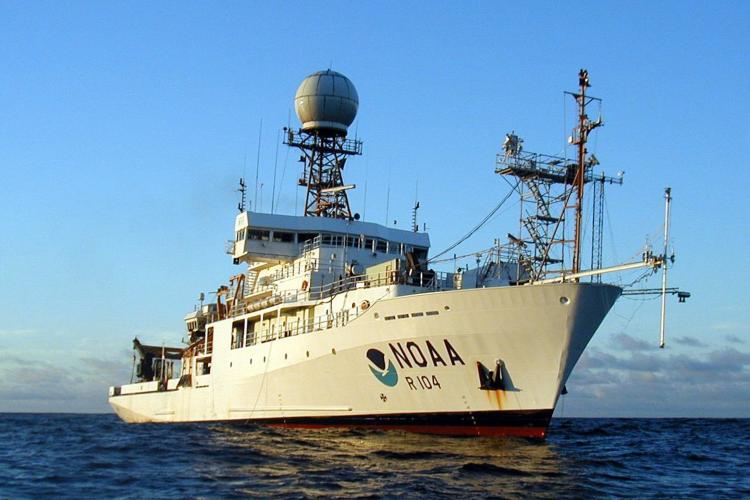
Credit: NOAA
Specifications
Contact Info
Charleston, SC
United States
About the ship
NOAA Ship Ronald H. Brown was built by Halter Marine, Inc. in Moss Point, Mississippi. The ship was commissioned on July 19, 1997, and is currently homeported in Charleston, South Carolina. Ronald H. Brown is a global-class oceanographic and atmospheric research platform, and is the largest vessel in the NOAA fleet. With its highly advanced instruments, the ship travels worldwide supporting scientific studies to increase our understanding of climate and the ocean.
Primarily deployed in support of NOAA’s Office of Oceanic and Atmospheric Research, the ship supports scientific studies to increase our understanding of the relationship between the world's oceans and climate. The ship’s combined atmospheric and oceanographic sampling capability allows scientists to observe dynamics at sea and determine how those dynamics affect climate and global weather patterns.
The ship’s five primary laboratories provide nearly 4,000 square feet of dedicated mission space with additional space on deck to support up to nine laboratory vans.
The ship is equipped with a suite of scientific sensors, including a multibeam echo sounder, sub-bottom profiler, acoustic Doppler current profiler, acoustic positioning system and Doppler radar.
Ronald H. Brown’s maneuvering capabilities--provided by a dynamic positioning system--enhance the ship’s ability to hold its position in the water within a 300-foot radius--in seas up to 11 feet, with wind speed of 27 knots and a 2-knot current. This capability is critical when deploying and recovering deep-sea moorings, supporting remotely operated vehicles, and deploying the sensors necessary for successful research.
The ship's projects are often conducted in partnership with other agencies. For instance, in early 2015, Ronald H. Brown supported a multi-agency two-month study to better understand the West Coast drought. The study focused on how the region’s rain and snow are impacted by “atmospheric rivers” (intense moisture-bearing winter storms) and airborne particles, like dust and pollution. In 2009, the ship was a part of a two-month investigation that involved the physical mechanisms of the Pacific Ocean that contributed to extremely low temperatures. The ship joined aircrafts from the U.S. and Britain and ships from Peru, in the study that took place off the coast of Peru.
The ship is named to honor the late Ronald H. Brown, the first African American to serve as Secretary of Commerce. Brown made it his mission to generate jobs and provide opportunities for ordinary Americans and he was an ardent supporter of the NOAA fleet. He was killed in a plane crash on April 3, 1996, while on a trade mission to Bosnia.

